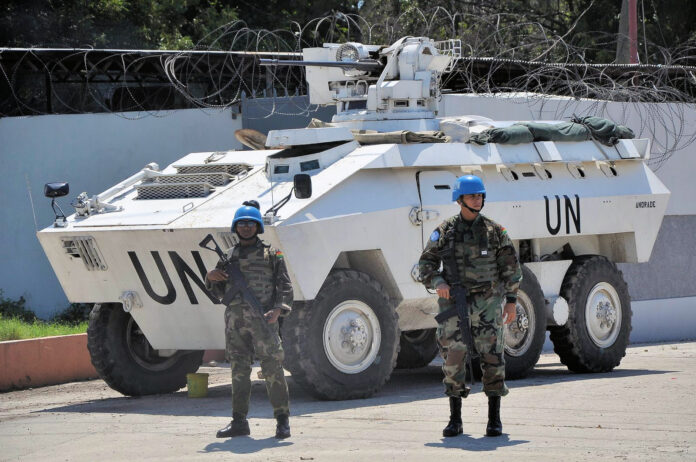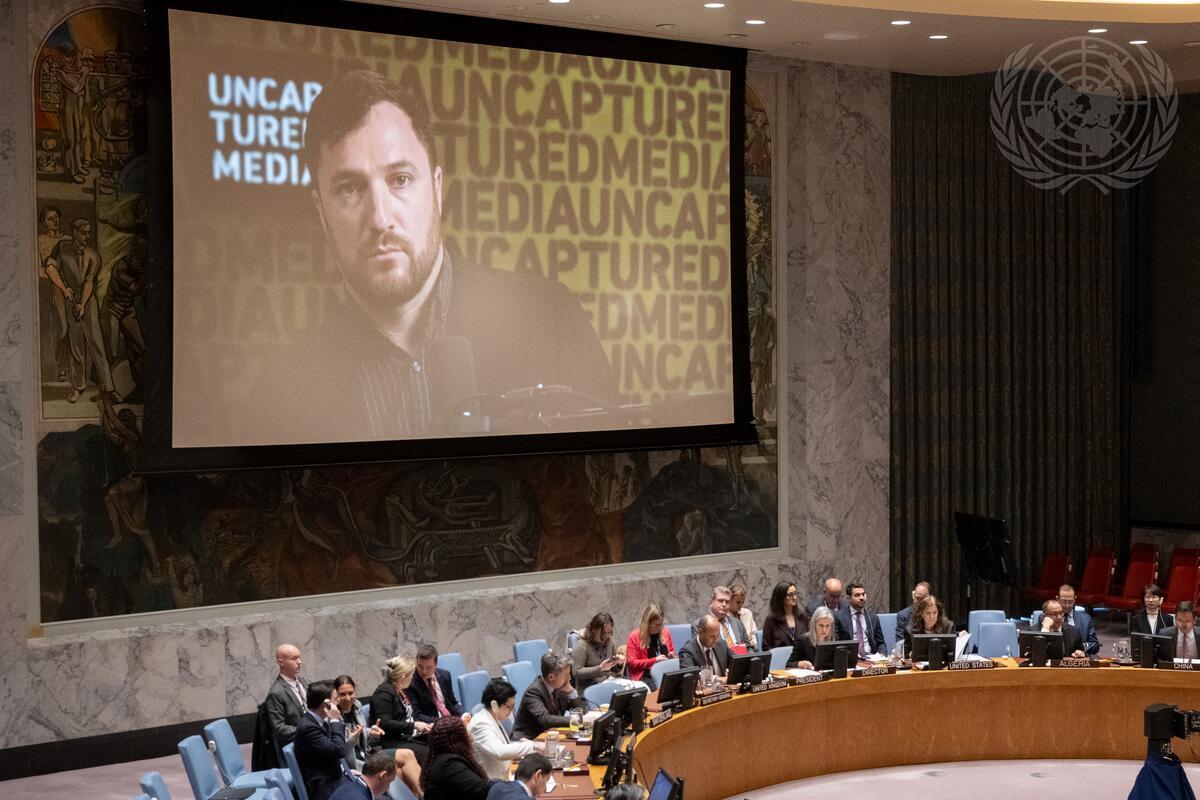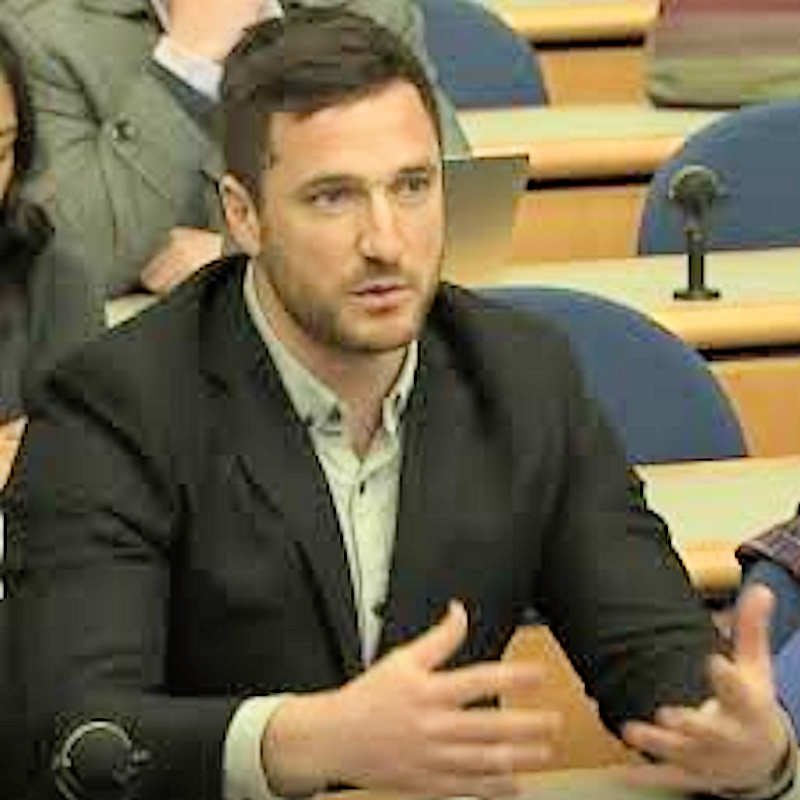
On Wed., Nov. 20, 2024, at 3 p.m., the United Nations Security Council (UNSC) met again to discuss whether to deploy another Chapter 7 UN military mission to Haiti, similar to the UN Mission to Stabilize Haiti (MINUSTAH), which deployed from 2004 to 2017.
The session was prompted by a Nov. 13 resolution adopted by the Permanent Council of the Organization of American States (OAS) which sought “to encourage the UNSC to urgently support Haiti’s request to transition the MSS [Multinational Security Support] mission into a UNPKO [UN Peace-Keeping Operation] under a United Nations mandate, while continuing to support robust coordination between the United Nations Integrated Office in Haiti (BINUH) and the MSS mission.”
One must realize that “Haiti’s request” came from the current president of the Anthony Blinken-fashioned Transitional Presidential Council (TPC), Leslie Voltaire, who has no more standing or legitimacy than some random street-vendor selling packets of water in a Port-au-Prince market.

In September, Washington already tried to upgrade the MSS into a UNPKO but could not get it through the UNSC. As a sort of compromise, on Sep. 30, the council unanimously approved a renewal of the MSS’s mandate for one year, starting Oct. 2. (Russia and China abstained from the vote in 2023.)
In the Nov. 20 session, in addition to the BINUH representative, the U.S. brought a Haitian “civil society” representative to press for the UNPKO. However, Russia and China, who are wise to Washington’s game, invited Dan Cohen, a well-known and well-respected independent journalist, who has intensively covered Haiti for the past four years, producing five films and many articles on the situation in the country.
Below is the text of Cohen’s address to the UN Security Council.
Kim Ives
Distinguished members of the council,
I am an investigative journalist and documentary filmmaker, one of the few independent journalists to report from Haiti in recent years. My most recent film is titled Haiti: Intervention versus Revolution.
The UN Security Council is being asked to approve deployment of another so-called “peace-keeping” mission to Haiti. Let us recall that Haiti has been under U.S. and UN occupation for 21 of the last 30 years, from 1994 to 2000 by UNMIH, UNSMIH, UNTMIH, and MIPONUH, and from 2004 to 2019 by MINUSTAH and MINUJUSTH. However, those two plus decades of occupation never achieved their stated goals.

In fact, UN soldiers, under the familiar pretext of “combating gangs”, in one operation that became emblematic of their conduct, wantonly fired some 22,000 bullets into the slum of Cite Soleil, killing residents in their ramshackle houses. These UN troops were also responsible for crimes against the Haitian people, from the introduction of cholera to the rape of children, for which they were never held accountable. Now, the Haitian people are being asked once again to let UN troops occupy their nation.
Yet it is clear that there is another agenda at play. The United States’ government, my government, seeks to impose its will on Haiti, with or without the approval of this council.
Don’t take my word for it. In December 2021, China and Russia voted to limit the Security Council mandate for U.S. trainers to the Haitian National Police to only nine months rather than the 12 months that Washington sought. This outraged U.S. Senator Robert Menendez, then the Chairman of the Senate Foreign Relations Committee. During a briefing to his committee, Menendez rhetorically asked a State Department official: “Why do you think China and Russia stopped us?” He answered his own question, saying: “They want total unrest in the hemisphere, that’s their whole purpose in this hemisphere, is creating instability.” He added, “At some point we have to think about how we circumvent that.”
In 2023, Washington indeed found a way to circumvent the UN Security Council when it was prevented from once again using this body, as it did in 1994 and 2004, to further its interventionist goals in Haiti. It concocted the Multinational Security Support mission or MSS, which U.S. representative to the UN, Jeffrey DeLaurentis, called “a new way of preserving global peace and security.”
Indeed, the United States has enacted legislation known as the Global Fragility Act, which might be better described as the Crumbling Empire Act. This bipartisan legislation, signed into law by President Trump in 2019 and continued under the Biden administration, seeks to combine military force and soft power to push back against the growing influence of China and Russia, which Washington, still applying its long-discredited imperial Monroe Doctrine, sees as a threat. Haiti is the pilot case for this new strategy, which the U.S. openly stated it seeks to apply to so-called fragile states around the world, beginning with Libya, Mozambique, Papua New Guinea, and Benin, Ivory Coast, Ghana, Guinea, and Togo in West Africa.
An intervention would meet stiff armed resistance and cause bloodshed to the Haitian population and among UN troops.
This intervention assumes that the Haitian people are incapable of solving their own problems, an insulting notion to those who know Haitian history. An intervention would be, first and foremost, a violation of Haitian sovereignty. But even more so, it would empower and support the forces which have carried out the most heinous acts of violence in Haiti today.
My outlet, Uncaptured Media, in collaboration with Haiti Liberté, recently published footage we obtained of a Haitian National Police officer summarily executing an unarmed civilian, picking his pocket, and then running over his corpse with an armored vehicle provided by the United States, ostensibly to fight gangs. This is not an isolated incident. A September 30 report by the Panel of Experts established pursuant to Security Council resolution 2653 addressed to the Security Council’s President noted that “From 1 January to 31 March 2024, 590 civilians unrelated to gangs were killed or injured during police operations against gangs.” The document cited reports that police officers had carried out extrajudicial executions as seen in the footage we published.
One must also note that the Kenyan police forces sent to Haiti under the auspices of the MSS have an abysmal human rights record going back decades.
A 2009 report by the UN Special Rapporteur on extrajudicial, summary or arbitrary executions Philip Alston found “death squads operating on the orders of senior police officials” killed 1,113 people following Kenya’s December 2007 elections. Little has changed since then. Even the U.S. State Department’s Kenya 2018 Rights Report noted “unlawful and politically motivated killings; forced disappearances; torture; harsh and life-threatening prison conditions.”
Any UN operation would work hand in glove with these corrupt and murderous Haitian and Kenyan police officers.
The proposed UN intervention, like that of the MSS, is a violation of Haitian law and the UN Charter. Haiti has no elected government, but a regime effectively appointed by the outgoing U.S. Secretary of State Anthony Blinken. Interim president Leslie Voltaire, who most recently requested UN military intervention, has zero legal authority, like former Prime Ministers Ariel Henry, Garry Conille, and now Alix Didier Fils-Aimé. Not one of them has ever been elected nor holds any respect or legitimacy outside of Washington, DC and this building. That such an illegal intervention is even being considered is an insult and affront to the Haitian people.
From my numerous visits to Haiti in recent years, it is clear that the overwhelming majority of the Haitian people do not want another intervention. In 2023, as this council considered whether to bless the MSS, Haitian popular organizations hung banners across main thoroughfares in Port-au-Prince saying no to intervention and reminding the population of the cholera outbreak it introduced.
The only sector of the Haitian population that supports an intervention are the tiny few who stand to benefit from it, who disproportionately live outside of the country, and who profit from the status quo of controlled chaos. They are the corrupt oligarchs who funded the armed groups to do their bidding and have now lost control of them, and those who Washington’s soft power arms like USAID and the National Endowment for Democracy have groomed as its preferred future leaders of Haiti.
For anyone who naively believes that foreign armed intervention would benefit the Haitian people, one only needs to examine the results of previous interventions, and remember the old adage, “Insanity is doing the same thing over and over again and expecting different results.”
In fact, this proposed intervention could be worse. Haiti is awash in military-grade weapons imported from the United States, thanks to lax gun laws and porous borders. An intervention would meet stiff armed resistance and cause bloodshed to the Haitian population and among UN troops. Haiti’s history is marked by its resistance to foreign invasions from its glorious 1804 revolution to today.
Haitian sovereignty must be respected, but first re-established by the Haitian people themselves. Let Haitians, not foreign bodies, choose their leaders and their future.
Thank you.









